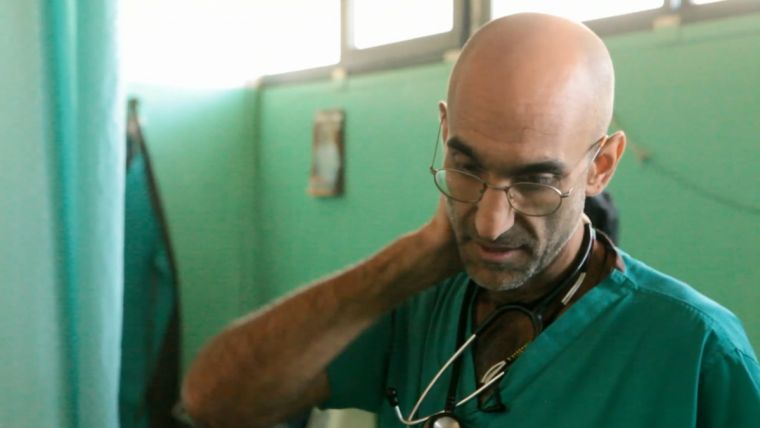New York Catholic missionary doctor based in Sudan praised by George Clooney as he wins $1m prize

A Catholic missionary doctor from New York has won an esteemed international prize for his work around the clock in war-torn Sudan.
The $1 million Aurora Prize for Awakening Humanity has been awarded to Dr Tom Catena, who has saved thousands of lives as the sole doctor permanently based in Sudan's war-ravaged Nuba Mountains where humanitarian aid is restricted.
The prize, granted by the Aurora Humanitarian Initiative on behalf of the survivors of the Armenian Genocide and in gratitude to their saviours, was announced at a ceremony in Yerevan, Armenia. Dr Catena was selected as the 2017 Aurora Prize Laureate from more than 550 nominations submitted from 66 countries.
George Clooney, the Academy Award-winning actor and co-chair of the Aurora Prize Selection Committee, praised Dr Catena. 'As violence and war continue to threaten people's spirits and perseverance, it is important to recognize, empower and celebrate people like Dr Catena who are selflessly helping others to not only survive, but thrive,' the actor said. 'Dr Catena is a role model to us all, and yet another example of people on the ground truly making a difference.'
Catena receives $100,000 and the opportunity to donate the accompanying $1,000,000 award to organisations of his choice. He has chosen the following three organisations: African Mission Healthcare Foundation (AMHF), USA; Catholic Medical Mission Board (CMMB), USA; and Aktion Canchanabury, Germany.
For the last nine years, Catena – known by locals as 'Dr Tom' – has been on-call 24 hours a day, seven days a week at the Mother of Mercy Catholic Hospital to care for more than 750,000 citizens of Nuba amid the ongoing civil war between the Government of Sudan and the Sudanese People's Liberation Movement.
It is estimated that Catena treats 500 patients per day and performs more than one thousand operations each year.
He said: 'We all have an obligation to look after our brothers and sisters. It is possible that every single person can make a contribution, and to recognise that shared humanity can lead to a brighter future. With my faith as my guide, I am honoured to continue to serve the world and make it a better place.'
Speaking on BBC Radio 4's Today programme this morning, Catena described how 'an average day' starts at around 5:30am; he attends Mass at 6:00am before heading to the hospital to begin the ward rounds. He then sees 'upwards of 400 patients' all day before being on call all night.
'For the sake of the patients and the work there I just kind of steel myself and put my head down and charge ahead,' he told Today. 'You're tired but you see one after another after another and before you know it you're finished.'
The doctor described how he is treating victims of the civil war that has been raging since 2011. This has meant a rise in malnutrition cases, he said, and other diseases such as TB.
'I hope to use this to highlight the plight of the people of the Nuba mountains and also to improve the healthcare of the people of Nuba which is very, very limited,' said Catena, who added that he plans to stay, and 'it will still be several years yet before I'm willing to pass the baton on'.
Vartan Gregorian, President of the Carnegie Corporation of New York, co-founder of the Aurora Humanitarian Initiative, and Aurora Prize Selection Committee member said: 'Dr Catena is an inspiration for to anyone who has ever doubted humanity. Despite tremendous injustice and sacrifice, he has dedicated his life to ensuring that the next generation has a brighter future. His service to others is an inspiration, and it is our hope that the individuals he has saved will continue the cycle of gratitude by becoming saviours themselves.'
The announcement of the 2017 Aurora Prize Laureate follows the release of the Aurora Humanitarian Index, the second annual global public opinion survey that gauges attitudes towards humanitarian responsibility, the effectiveness of humanitarian intervention and individuals' motivations to intervene on behalf of others.
The Index found that support for humanitarian action is falling steeply, and that a rise in populism around the world is affecting the public's perception of efforts made to help refugees around the world.
'We hope the findings from this year's Aurora Humanitarian Index serve as motivation for individuals around the world to not only understand their capacity for meaningful impact, but be inspired to act upon it,' said Noubar Afeyan, co-founder of the Aurora Humanitarian Initiative. 'Through the Aurora Humanitarian Initiative, we encourage those touched by Dr. Catena's selfless work to make their own mark on the world by expanding the circle of saviors, and most importantly survivors. It is possible for us all to play a role in renewing hope in humanity.'











